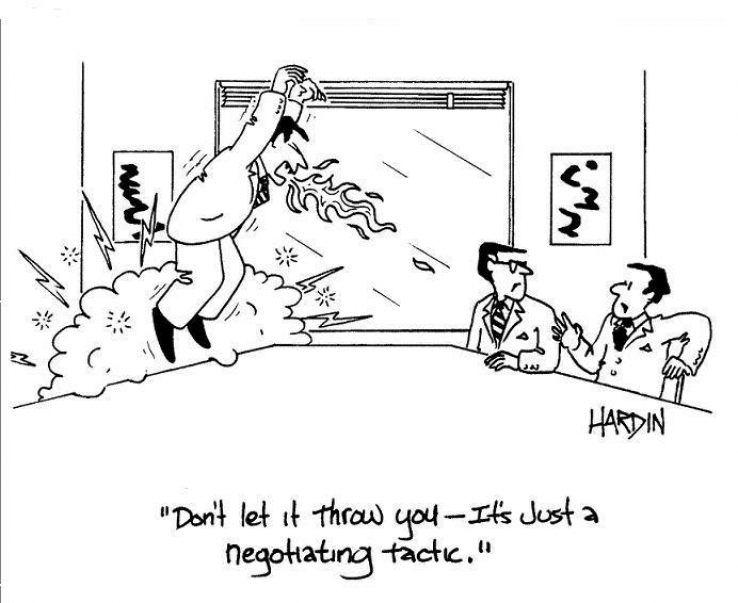LEADING OTHERS: Making the Ask
Description

Image Credit: www.under30ceo.com
Negotiation skills are one of the most critical skills for young leaders to develop. It helps you deal with rejection, find middle ground and distance yourself from an entitlement mentalityStart with this checklist and know your answers to the questions posed below.
- Goals: What do you want to get out of the negotiation? What do you think the other person wants?
- Trades: What do you and the other person have that you can trade? What do you each have that the other wants? What are you each comfortable giving away?
- Alternatives: if you don't reach agreement with the other person, what alternatives do you have? Are these good or bad? How much does it matter if you do not reach agreement? Does failure to reach an agreement cut you out of future opportunities? And what alternatives might the other person have?
- Relationships: What is the history of the relationship? Could or should this history impact the negotiation? Will there be any hidden issues that may influence the negotiation? How will you handle these?
- Expected outcomes: What outcome will people be expecting from this negotiation? What has the outcome been in the past, and what precedents have been set?
- The consequences: What are the consequences for you of winning or losing this negotiation? What are the consequences for the other person?
- Power: Who has what power in the relationship? Who controls resources? Who stands to lose the most if agreement isn't reached? What power does the other person have to deliver what you hope for?
- Possible solutions: Based on all of the considerations, what possible options might there be?
(Adapted from Win-Win Negotiations by James Manktelow & Amy Carlson on MindTools.com)
Style is critical when it comes to negotiations. Here are some tips.
Smile. You can hear and see and sense a smile. Mona Lisa was famous for her smile. Mother Teresa once said: “peace begins with a smile”. For all you know, the balance of power is in a smile. Remember that the next time you walk into a collegial meeting or a tough negotiation.
Soften your tone. If you walk into a bar sounding like you are ready for a fight, you will get one. Sometimes how you say something is more important than what you say. Be calm and collected with your tone and purposeful with your words. You are much more likely to get heard that way.
Stroke ego. Be charming. Make people feel good about who they are. A simple statement such as: “Thank you for taking the time to speak with me.” – can go a long way to demonstrating that you value that person’s time and the role they will play in helping you get what you want.
Make the big ask. Be prepared to ask for what you want. Most people aren’t mind readers. Beating around the bush is no good.
Find someone more experienced. The truth is most organizations are set up as hierarchies. That means that the power to make decisions is in the hands of the top two tiers of any organization. As you work your way down the ladder, people have significantly less authority. Sometimes you are dealing with people on the bottom rung and they are only authorized to do as much as they are told. That’s when you might want to speak with someone who is empowered to say “yes” or “maybe” when you make your big ask.
Don’t fake it. Be genuine. If you are not satisfied, don’t say you are. Make sure you walk away with something that works for you. Maybe it is just the first step on a much longer path but it if works, then it is a start.
Be unforgettable. There are two ways to go about this: 1) build a bridge or 2) burn that bridge. Don’t miss an opportunity to be gracious and say “thank you”. No one forgets a “thank you” and it leaves a positive vibe. Choose not to leave that impression and instead, you will either make someone feel used or snubbed.
(Adapted from The Art of Persuasion by Kristle Calisto-Tavares)
Task
1. Review the content and links in this activity.
2. Brainstorm a situation in which you would need to negotiate. It could be for a purchase of something or even a contract or salary.
3. Use the checklist to guide you through the process of preparing for a negotiation. Answer all questions.
Learning Objectives
Through this activity, you will gain clarity around what you really “want” and how to develop a strategy in alignment with that. Featured skills and competencies include: relationship building, negotiation, dealing with ambiguity, being strategic, being persistent and being decisive.
Continue to LEADING OTHERS: Project Management Toolkit »
